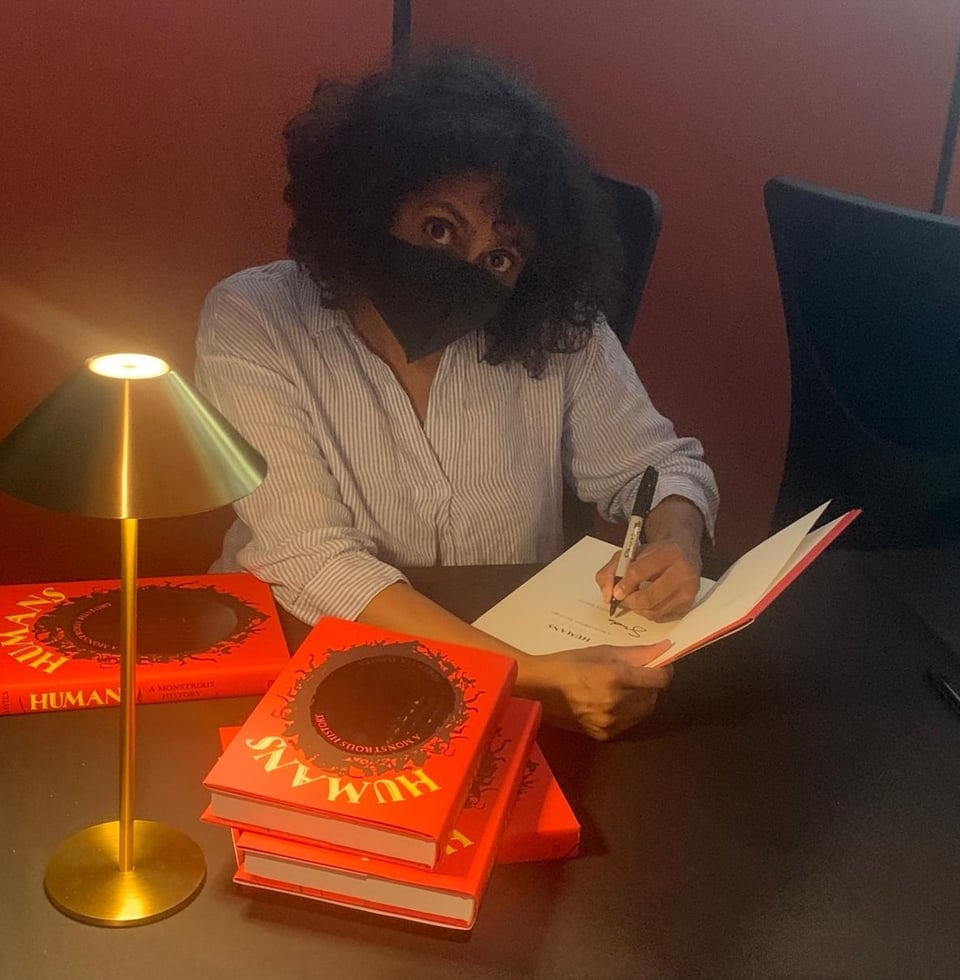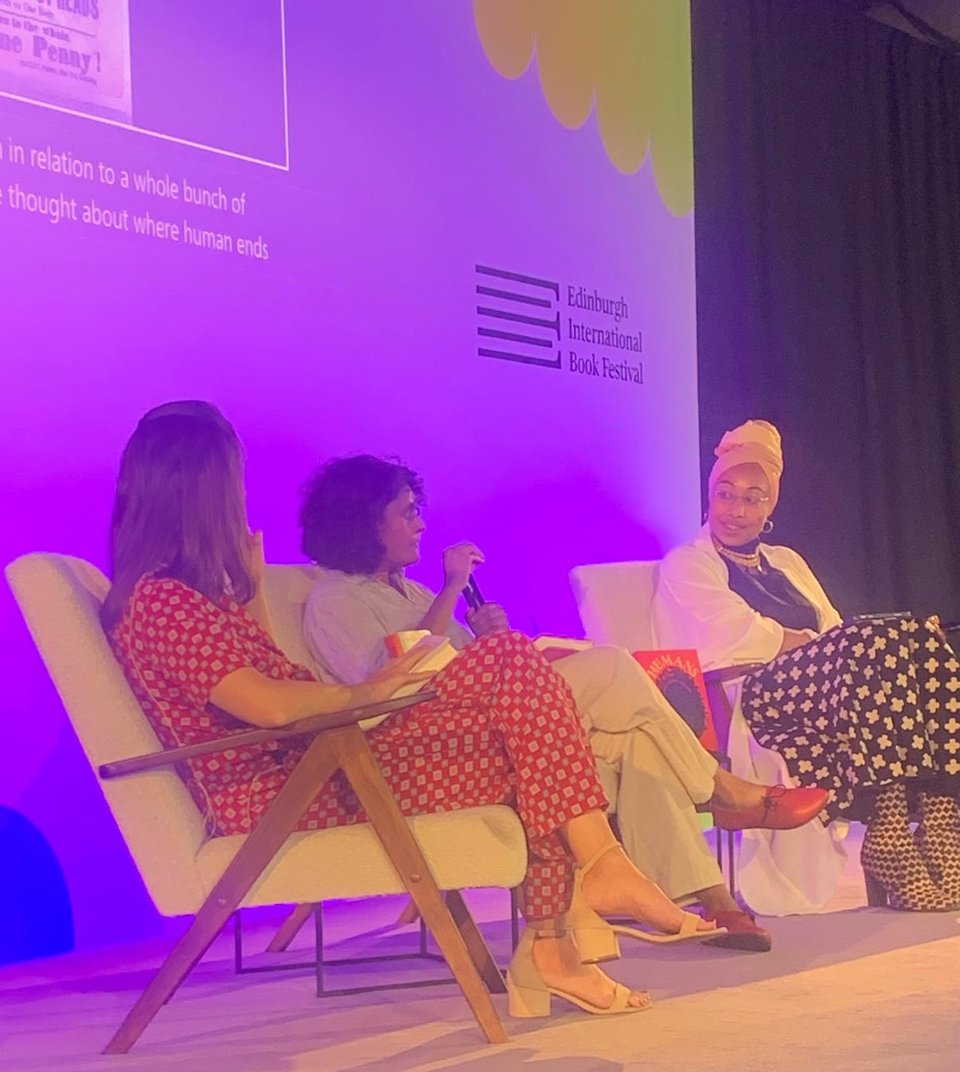The Edinburgh Book Festival and a preview of fall monstery stuff

Thanks for reading my free newsletter! If you’d like to support my work, you might consider buying or gifting HUMANS: A MONSTROUS HISTORY. Excellent free ways to support me include: borrowing HUMANS from your library or recommending they buy it; reviewing the book on Goodreads, Amazon, Storygraph, Waterstones, or Barnes and Noble; adding it to your wish list or TBR list; or telling friends, family, colleagues, or students about it.
Welcome back everyone, and hallo new readers! In today’s newsletter: the Edinburgh International Book Festival, Halloween planning; a September virtual event; some podcast interviews on Christopher Columbus and about a foundational piece of monster-ridden pop culture; and a goofball surprise newsflash.
The Edinburgh International Book Festival

Earlier this month I went to the Edinburgh International Book Festival. I’m still a little dazed in the aftermath. So many authors, so many talks! The most beautiful venue! Reuniting with old friends who came out to hear me!
This was only my third book festival (my second as a speaker), but what I’ve loved so far is how a festival’s short (one-hour-long) events are conversations from start to finish: there’s a chair who interviews the author or authors for the first part of each event, and then there’s plenty of time for audience questions. Straight after an event the authors do book signings and continue chatting.

This is very different from an academic conference. Here, panels are typically ninety minutes or even two hours long. Speakers usually give talks of between twenty and (if a keynote speaker) fifty minutes, with a bit of q and a at the end. I’ve been surprised at how much more energizing it is to hear a one-hour conversation than a monologue no matter how fascinating the material and inspiring the speaker. That said, I would happily listen to Sir Patrick Stewart or LeVar Burton reading out the dictionary, so there’s that.

I spoke on a panel called Who Counts As Human?, alongside award-winning investigative journalist Nicola Kelly, author of ANYWHERE BUT HERE: How Britain’s Broken Asylum System Fails Us All. Our interviewer and panel chair was writer and broadcaster Yassmin Abdel-Magied. Our conversations with the wonderful audience ranged from the ancient world to the current news cycle. I talked about what I call monstrification: the act of telling stories about individuals or groups in such a way as to separate them off from everyone else. Monstrification frames the subjects of these stories as people who don’t deserve dignity, safety, or equal treatment under the law because of the unique (read category-disrupting or monstrous) threats they supposedly pose to society.
One of the things I said that resonated strongly with the audience was that when famous individuals monstrify people they are practising what’s known as stochastic terrorism: disseminating a dehumanizing story using inflammatory language that inspires other people to commit violent acts (shooting up or burning down schools, nightclubs, places of worship, workplaces, or residences) while keeping their own hands clean. This is currently the far-right politicians’ playbook in the UK for terrorizing asylum seekers (among other people). If you want to understand the systemic problems of the small boats refugee crisis in the UK, as well as the responsibility the UK and other Western countries bear for the fact that some of these people need to flee their homes and seek asylum at all (think Afghan allies of Western governments, for instance), start with Nicola Kelly’s book.
And how might we mend the rifts of monstrification? I was blown away by the funny yet politically astute and profound observations that the journalist and political activist Ash Sarkar made when talking about her new book, Minority Rule: Adventures in the Culture Wars, an instant Sunday Times bestseller. In the book Sarkar argues that stoking fears of minorities is a strategy to divide up the majority “while the real ruling minority of hedge fund managers, press barons, landlords and corporations remain on top” and grab even more wealth and power.
Halloween approaches: join the conversation!
With Halloween around the corner, monster-themed writing will be seasonal as opposed to merely timely in ways we wish it wasn’t. Do you have a favourite monster novel or movie? Are you looking forward to reading or watching anything spooky in addition to Guillermo del Toro’s Frankenstein premiering at the Venice Film Festival as I type?
Feel free to share your thoughts in the comments to this newsletter or to drop me an email. You can even share this newsletter on social media along with a note about your favourite fictional monster! Feel free to tag me (links to the channels I use are at the bottom of this newsletter; I’m most regularly on BlueSky.).
Upcoming virtual event
16 Sept, 8:15pm UK (3:15pm ET) "Humans: A Monstrous History, Monsters and the Politics of Projection" organized by the British Psychoanalytical Society.
Recording available for a week. Get tickets here.
Podcasts
This Guy Sucked is “for haters, by historians.” I talked with historian Claire E. Aubin about Christopher Columbus and how he’s remembered. Advance access available for paid subscribers right now! Check out the free preview here.
For 5am StoryTalk, a podcast brimming with interviews with book authors, screenwriters, and other writerly types about stories in all their forms, I chatted in two episodes with screenwriter, novelist, and comic book -writer Cole Haddon. The first episode is about HUMANS: A MONSTROUS HISTORY. Subscribe for free wherever you get your podcasts to receive it on Sept 11. For immediate access to this and many other episodes, subscribe for free to the 5am StoryTalk newsletter.
In the second interview Cole and I discussed a monster-themed piece of iconic television. This episode is currently available only to paid subscribers. To access it and other interviews about foundational artworks immediately, become a paid subscriber to 5am StoryTalk (free preview of the episode here). For more about this series and upcoming guests, check out the Season 2 trailer here!
And in case you missed it, I was interviewed by Suzannah Lipscomb about HUMANS: A MONSTROUS HISTORY on Not Just The Tudors. Our convo focused on the early modern era (1450-1800), touching on ancient and medieval precedents, the age of exploration, race, gender, empire, and the human-animal continuum.
Newsflash: achievement unlocked!
The benighted couch I wrote about in “How Not To Buy A Couch” - an essay with profound life hacks I should hang on a sheet hung in front of my face - has left the building. My neighbour collected it for his sister. This happened while I was away, so I didn’t even have to watch while they got the behemoth down the vertiginous building stairs (after removing the handrail). Asked about the process he said, “Don’t get me started.”
No more vacuuming in Hard Mode: hooray!
Add a comment: